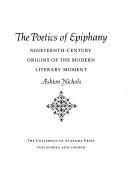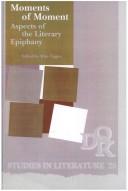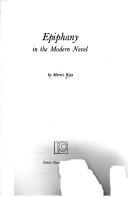| Listing 1 - 10 of 17 | << page >> |
Sort by
|
Book
ISBN: 1443891746 9781443891745 1443881694 9781443881692 Year: 2017 Publisher: Newcastle upon Tyne
Abstract | Keywords | Export | Availability | Bookmark
 Loading...
Loading...Choose an application
- Reference Manager
- EndNote
- RefWorks (Direct export to RefWorks)
Unprecedented changes appear to be occurring more often and more rapidly than ever before. We notice these changes and events more readily due to the advent of the information age and the continual technological innovation that has accompanied it. New methods of the manufacture and the dissemination of information expose us to crises in ways previously impossible. These crises often lead to the exposure of new ways of understanding. The lifting of veils allows us to see these crises more clearly. In turn, these epiphanies invite imaginative and creative responses. This volume interprets this situation in a new way--not just as an examination of what happens to us and the variety of crises we face, but the way in which we understand them. How do we produce new ways of thinking and discussing crises? What is the role of imagination in both the description of crisis and the response to it? How are we changed and how do we change our thinking and writing as a result? There are two sides of the veil, with crisis on one side and imagination on the other. The issue of lifting veils--of revelatory change--expresses the contributors' interest in the intersection of and collaboration between different disciplines. As an interdisciplinary project, this book takes a new approach in discussing our current condition. Lifting the veil radically undoes the past, opens us to the future through change, and provides the possibility for vision and hope.
Crises. --- Epiphanies. --- Epiphany (Insight) --- Insight --- Change

ISBN: 0817303278 Year: 1987 Publisher: Tuscaloosa University of Alabama press
Abstract | Keywords | Export | Availability | Bookmark
 Loading...
Loading...Choose an application
- Reference Manager
- EndNote
- RefWorks (Direct export to RefWorks)
English poetry --- Epiphanies in literature --- History and criticism
Book
Year: 2015 Publisher: New York, NY : Columbia University Press,
Abstract | Keywords | Export | Availability | Bookmark
 Loading...
Loading...Choose an application
- Reference Manager
- EndNote
- RefWorks (Direct export to RefWorks)
Flashes of insight-the "Eureka!" moments that produce new and useful ideas in a single thought-are behind some of the world's most creative and practical innovations. This book shows how to cultivate more and better flashes of insight by harnessing the science and practice of the "seventh sense."Drawing from psychology, neuroscience, Asian philosophy, and military strategy, William Duggan illustrates the power of the seventh sense to help readers aspire to and achieve more in their personal and professional lives. His examples include Gandhi, Joan of Arc, Starbucks founder Howard Shultz, and executives and students he has taught in his classes. His book presents specific steps in the form of three practical tools to help prepare the mind, see and seize opportunity, and follow through on one's resolution. Based on Duggan's perennially popular Columbia Business School course, this book teaches the mental skills and discipline that power the seventh sense.
Insight. --- Creative ability. --- Creative thinking. --- Epiphanies. --- Change (Psychology)
Book
ISBN: 9781982100650 Year: 2018 Publisher: New York, NY Gallery Books / Simon & Schuster, Inc.
Abstract | Keywords | Export | Availability | Bookmark
 Loading...
Loading...Choose an application
- Reference Manager
- EndNote
- RefWorks (Direct export to RefWorks)
testimony --- abuse --- exiting --- NXIVM --- love bombing --- epiphanies --- intervention --- doomsday

ISBN: 9042006366 9004484248 Year: 1999 Volume: 25 Publisher: Amsterdam Rodopi
Abstract | Keywords | Export | Availability | Bookmark
 Loading...
Loading...Choose an application
- Reference Manager
- EndNote
- RefWorks (Direct export to RefWorks)
Comparative literature --- Thematology --- anno 1800-1999 --- Epiphanies dans la littérature --- Epiphanies in literature --- Openbaringen in de literatuur --- Literature [Modern ] --- 19th century --- History and criticism --- 20th century
Multi
ISBN: 8372670013 Year: 1999 Publisher: Nürnberg : Friedrich-Alexander-Universität Erlangen-Nürnberg,
Abstract | Keywords | Export | Availability | Bookmark
 Loading...
Loading...Choose an application
- Reference Manager
- EndNote
- RefWorks (Direct export to RefWorks)
Book
ISBN: 9780198723929 019872392X 0191791245 Year: 2015 Publisher: Oxford : Oxford University Press,
Abstract | Keywords | Export | Availability | Bookmark
 Loading...
Loading...Choose an application
- Reference Manager
- EndNote
- RefWorks (Direct export to RefWorks)
"In ancient Greece, epiphanies were embedded in cultural production, and employed by the socio-political elite in both perpetuating pre-existing power-structures and constructing new ones. This volume is the first comprehensive survey of the history of divine epiphany as presented in the literary and epigraphic narratives of the Greek-speaking world. It demonstrates that divine epiphanies not only reveal what the Greeks thought about their gods; they tell us just as much about the preoccupations, the preconceptions, and the assumptions of ancient Greek religion and culture. In doing so, it explores the deities who were prone to epiphany and the contexts in which they manifested themselves, as well as the functions (narratives and situational) they served, addressing the cultural specificity of divine morphology and mortal-immortal interaction. 'Divine epiphany in Greek literature and culture' re-establishes epiphany as a crucial mode in Greek religious thought and practice, underlines its centrality in Greek cultural production, and foregrounds its impact on both the political and the societal organization of the ancient Greeks."
Greek literature --- Epiphanies in literature. --- History and criticism. --- Greek literature. --- Griechisch --- Literatur --- Epiphanie --- Griechisch. --- Literatur. --- Epiphanie.
Book
ISBN: 0199338892 0190690275 0199338884 9780199338887 9780199338870 0199338876 Year: 2015 Publisher: Oxford ; New York : Oxford University Press,
Abstract | Keywords | Export | Availability | Bookmark
 Loading...
Loading...Choose an application
- Reference Manager
- EndNote
- RefWorks (Direct export to RefWorks)
"Why do "aha moments" strike us suddenly? Why do they so often come to us when we are focused on something completely unrelated? And when great ideas "come to" us, where do they come from? In Aha!: The Moments of Insight that Shape Our World, philosopher William B. Irvine explores these epiphanies, from the minor insights that strike us all daily, to the major realizations that alter the course of history. Focusing on aha moments as they take place in five different domains--religion, morality, science, math, and art--Irvine provides case studies that shed light on the different ways epiphanies happen in the different domains, and on their differing social impact. Along the way, he describes some of the great aha moments in history, from ancient times to the present day. We like to think that our greatest thoughts are the product of our conscious mind. Irvine demonstrates, though, that it is our unconscious mind that is the source of our most significant insights, and that the role the conscious mind plays in eliciting these insights is to try, unsuccessfully, to solve certain problems. Only if the conscious mind is willing to do this--and thereby experience considerable frustration--is the unconscious mind likely to reward it with a breakthrough insight--that the conscious mind will then take credit for. Irvine explores not only the neuroscience of aha moments but also their personal and social ramifications. How does a person respond to having a breakthrough insight that goes against a dominant paradigm? And how does the world respond when she shares that insight? He shows that in many cases, what is most remarkable about those who have had the great insights of human history is not their but their courage and perseverance in fighting for the world to accept them"--
Insight. --- Epiphanies. --- Epiphany (Insight) --- Insight --- Intuition --- Problem solving --- Thought and thinking
Book
ISBN: 0813057434 0813065496 0813066328 0813065666 0813068134 Year: 2020 Publisher: Gainesville, Fl University Press of Florida
Abstract | Keywords | Export | Availability | Bookmark
 Loading...
Loading...Choose an application
- Reference Manager
- EndNote
- RefWorks (Direct export to RefWorks)
"This book is the first in-depth study of the forty short texts James Joyce called "epiphanies." Sangam MacDuff argues that the epiphanies are an important point of origin for Joyce's entire body of work, showing how they shaped the structure, style, and language of his later writings"--
Joyce, James, --- Criticism and interpretation. --- Literature & literary studies --- Epiphanies --- James Joyce

ISBN: 0720601118 9780720601114 Year: 1971 Publisher: London Peter Owen
Abstract | Keywords | Export | Availability | Bookmark
 Loading...
Loading...Choose an application
- Reference Manager
- EndNote
- RefWorks (Direct export to RefWorks)
Comparative literature --- Fiction --- Thematology --- English fiction --- American fiction --- Epiphanies in literature --- History and criticism --- -American fiction --- -Epiphanies in literature --- American literature --- English literature --- Epiphanies in literature. --- History and criticism. --- English fiction - 20th century - History and criticism --- American fiction - 20th century - History and criticism
| Listing 1 - 10 of 17 | << page >> |
Sort by
|

 Search
Search Feedback
Feedback About UniCat
About UniCat  Help
Help News
News